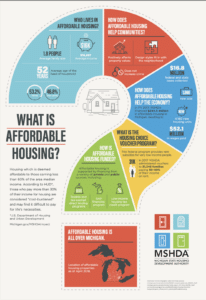Michigan has a long history of commitment to providing safe and affordable housing to its residents. However, with the continued rise in housing prices, the state is facing an increasing need for affordable housing options. Professional property management has made a positive impact in bridging the gap, but more help is needed from legislation to remove barriers in construction and zoning, so the developments can happen at the rate that demand requires.
Michigan’s commitment to affordable housing dates back to the 1930s when it was one of the first states to create a public housing authority. The federal government’s New Deal program provided resources and funding to Michigan, leading to the construction of many public housing projects throughout the state. In the 1960s, the state established the Michigan State Housing Development Authority (MSHDA), which helped finance affordable housing projects and provided rental assistance to low-income families.
Despite the state’s long-standing commitment, there have been challenges in recent years. The 1980s saw a boom in the construction of affordable housing units, but this trend declined in the following decade due to budget cuts and a lack of funding. According to a 2020 report by the National Low Income Housing Coalition, Michigan has a shortage of over 157,000 affordable and available rental homes for extremely low-income renters. This report also found that there are only 36 affordable and available rental homes for every 100 extremely low-income renter households in Michigan.
The COVID-19 pandemic has further exacerbated the need for affordable housing in Michigan as many residents have lost their jobs or seen their income decrease due to the economic downturn. While professional property management has made a positive impact in bridging the gap, the state needs help from legislation to remove barriers in construction and zoning. This will help make the developments happen at the rate that demand requires, and more low-income renters will have access to safe and affordable housing.
In conclusion, Michigan must continue to invest in affordable housing projects and provide rental assistance to help ensure that all residents have access to safe and affordable housing. The state has a history of supporting affordable housing, and with continued effort and support, Michigan can address the current shortage of available units for low-income renters.


